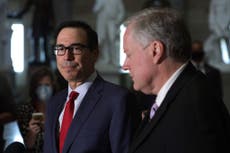‘There’s no place for hate in America’: Biden pleads for national unity at site of Gettysburg
Former VP’s remarks were meant to stand in stark contrast to Trump’s equivocation at debate on white supremacist group
Democratic presidential nominee Joe Biden delivered what could well be remembered as the signature speech of his 2020 campaign so far, calling on Americans to ditch the fierce partisanship that has gripped the nation during the Donald Trump era and “turn division into unity”.
Speaking on the site of the Civil War battlefield at Gettsyburg, Pennsylvania, on Tuesday, the former Democratic vice president shelved any talk about specific policy proposals in favour of a more grandiose, yet elemental speech about American ideals.
“As president … I will send a clear, unequivocal message to the entire nation. There is no place for hate in America,” Mr Biden said, standing before six American flags on a hill with the battlefield in the background.
“It will be given no licence. It will be given no oxygen,” he said, contrasting himself with the Trump campaign’s unwillingness after the first presidential debate last week to categorically denounce white supremacist groups such as the far-right, so-called Proud Boys.
White House press secretary Kayleigh McEnany clashed with reporters last week about Mr Trump’s order for the white supremacist Proud Boys to “stand back and stand by,” arguing that the administration has repeatedly denounced white supremacist groups. The White House press corps pushed back that the president’s record rebuking white supremacists is checkered.
Mr Biden once again denounced the “violence and looting and burning” that was set off in several American cities over the summer amid racial justice protests after the deaths and police shootings of George Floyd in Minneapolis, Breonna Taylor in Louisville, Jacob Blake in Kenosha, Wisconsin, and others.
The vast majority of racial justice protests are peaceful, although some have wrought significant economic destruction in some pockets of Portland, Oregon, as well as Kenosha, Chicago and elsewhere.
The former vice president has focused most of his campaign messaging surrounding the racial justice protests on the longstanding plight of communities of colour in the US that historically have not been treated as fairly or equitably as white Americans.
“I do not believe we have to choose between law and order and racial justice in America. We can have both,” Mr Biden said on Tuesday, echoing his comments from the debate the week before that he believes in “law and order with justice, where people get treated fairly”.
He continued on Tuesday: “This is a nation strong enough to both honestly face systemic racism and strong enough to provide safe streets for our families and small businesses that too often bear the brunt of this looting and burning.”
The Battle of Gettysburg, fought from 1 to 3 July 1863, is one of the most famous military bloodbaths in US history, with more than 50,000 cumulative casualties between the Confederate and Union troops.
The eventual Union victory at Gettysburg marked the turning point of the war whose conclusion resulted in the emancipation of enslaved blacks in America.
In the decades since the battle, Gettysburg has been the site of several momentous speeches by US politicians.
Roughly four months after the battle, President Abraham Lincoln delivered his famous “Gettysburg Address”, which is engraved in full on the walls of the Lincoln Memorial in Washington, DC.
President Lyndon B Johnson memorialised the 100-year anniversary of the battle with a speech in 1963 lamenting the slow progress for black Americans in the years since the Civil War’s conclusion.
“One hundred years ago, the slave was freed,” Mr Johnson said at the battleground’s cemetery.
“One hundred years later, the negro remains in bondage to the color of his skin,” Mr Johnson said, just a year before he signed the landmark 1964 Civil Rights Act into law as president.
On Tuesday, Mr Biden repeated his well-worn campaign pledge to represent even those Americans who don’t end up voting for him, saying he’s running as a “proud Democrat” but that he would “govern as an American president”.
That is not something Mr Trump has done, Mr Biden indicated. In dark undertones, he suggested the president has instead sought to exploit partisan and ideological divisions over his three and a half years in office.
“You don't have to agree with me on everything, even on most things, to see that what we're experiencing today is neither good nor normal,” he said.
“There's something bigger going on in this nation than just our broken politics. Something darker, something more dangerous. I'm not talking about ordinary differences of opinion. Competing viewpoints give life and vibrancy to our democracy. No, I'm talking about something different, something deeper. Too many Americans seek not to overcome our divisions, but to deepen them,” Mr Biden said.
“We must seek not to build walls but bridges,” he said. “We must seek not to have our fists clenched, but our arms open.”
Join our commenting forum
Join thought-provoking conversations, follow other Independent readers and see their replies
Comments




Bookmark popover
Removed from bookmarks